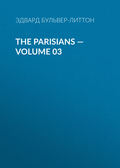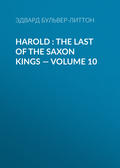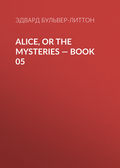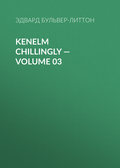
Эдвард Бульвер-Литтон
Zicci — Volume 02
It was then that Zicci rose. "Well, gentlemen," said he, "we have not yet wearied our host, I hope, and his garden offers a new temptation to protract our stay. Have you no musicians among your train, Prince, that might regale our ears while we inhale the fragrance of your orange- trees?"
"An excellent thought," said the Prince. "Mascari, see to the music."
The party rose simultaneously to adjourn to the garden; and then, for the first time, the effect of the wine they had drunk seemed to make itself felt.
With flushed cheeks and unsteady steps they came into the open air, which tended yet more to stimulate that glowing fever of the grape. As if to make up for the silence with which the guests had hitherto listened to Zicci, every tongue was now loosened; every man talked, no man listened. In the serene beauty of the night and scene there was something wild and fearful in the contrast of the hubbub and Babel of these disorderly roysterers. One of the Frenchmen in especial, the young Due de R—,—a nobleman of the highest rank, and of all the quick, vivacious, and irascible temperament of his countrymen,—was particularly noisy and excited. And as circumstances, the remembrance of which is still preserved among certain circles of Naples, rendered it afterwards necessary that the Due should himself give evidence of what occurred, I will here translate the short account he drew up, and which was kindly submitted to me some few years ago by my accomplished and lively friend, il Cavaliere di B—.
I never remember [writes the Due] to have felt my spirits so excited as on that evening; we were like so many boys released from school, jostling each other as we reeled or ran down the flight of seven or eight stairs that led from the colonnade into the garden, —some laughing, some whooping, some scolding, some babbling. The wine had brought out, as it were, each man's inmost character. Some were loud and quarrelsome, others sentimental and whining; some, whom we had hitherto thought dull, most mirthful; some, whom we had ever regarded as discreet and taciturn, most garrulous and uproarious. I remember that in the midst of our most clamorous gayety my eye fell upon the foreign cavalier, Signor Zicci, whose conversation had so enchanted us all, and I felt a certain chill come over me to perceive that he bore the same calm and unsympathizing smile upon his countenance which had characterized it in his singular and curious stories of the court of Louis XV. I felt, indeed, half inclined to seek a quarrel with one whose composure was almost an insult to our disorder. Nor was such an effect of this irritating and mocking tranquillity confined to myself alone. Several of the party have told me since that on looking at Zicci they felt their blood rise and their hands wander to their sword-hilts. There seemed in the icy smile a very charm to wound vanity and provoke rage. It was at this moment that the Prince came up to me, and, passing his arm into mine, led me a little apart from the rest. he had certainly indulged in the same excess as ourselves, but it did not produce the same effect of noisy excitement. There was, on the contrary a certain cold arrogance and supercilious scorn in his bearing and language, which, even while affecting so much caressing courtesy towards me, roused my self-love against him. He seemed as if Zicci had infected him, and that in imitating the manner of his guest he surpassed the original, he rallied me on some court gossip which had honored my name by associating it with a certain beautiful and distinguished Sicilian lady, and affected to treat with contempt that which, had it been true, I should have regarded as a boast. He spoke, indeed, as if he himself had gathered all the flowers of Naples, and left us foreigners only the gleanings he had scorned; at this my natural and national gallantry was piqued, and I retorted by some sarcasms that I should certainly have spared had my blood been cooler. He laughed heartily, and left me in a strange fit of resentment and anger. Perhaps (I must own the truth) the wine had produced in me a wild disposition to take offence and provoke quarrel. As the Prince left me, I turned, and saw Zicci at my side.
"The Prince is a braggart," said he, with the same smile that displeased me before. "He would monopolize all fortune and all love. Let us take our revenge."
"And how?"
"He has at this moment in his house the most enchanting singer in Naples,—the celebrated Isabel di Pisani. She is here, it is true, not by her own choice,—he carried her hither by force; but he will pretend to swear that she adores him. Let us insist. on his producing the secret treasure; and when she enters, the Duc de Lt— can have no doubt that his flatteries and attentions will charm the lady and provoke all the jealous fears of our host. It would be a fair revenge upon his imperious self conceit."
This suggestion delighted me. I hastened to the Prince. At that instant the musicians had just commenced. I waved my hand, ordered the music to stop, and addressing the Prince, who was standing in the centre of one of the gayest groups, complained of his want of hospitality in affording to us such poor proficients in the art while he reserved for his own solace the lute and voice of the first performer in Naples. I demanded, half laughingly, half seriously, that he should produce the Pisani. My demand was received with shouts of applause by the rest. We drowned the replies of our host with uproar, and would hear no denial. "Gentlemen," at last said the Prince, when he could obtain an audience, "even were I to assent to your proposal, I could not induce the signora to present herself before an assemblage as riotous as they are noble. You have too much chivalry to use compulsion with her, though the Due de R— forgets himself sufficiently to administer it to inc."
I was stung by this taunt, however well deserved. "Prince," said I, "I have for the indelicacy of compulsion so illustrious an example that I cannot hesitate to pursue the path honored by your own footsteps. All Naples knows that the Pisani despises at once your gold and your love; that force alone could have brought her under your roof; and that you refuse to produce her because you fear her complaints, and know enough of the chivalry your vanity sneers at to feel assured that the gentlemen of France are not more disposed to worship beauty than to defend it from wrong."
"You speak well, sir," said Zicci, gravely;—"the Prince dare not produce his prize."
The Prince remained speechless for a few moments, as if with indignation. At last he broke out into expressions the most injurious and insulting against Signor Zicci and myself. Zicci replied not; I was more hot and hasty. The guests appeared to delight in our dispute. None except Mascari, whom we pushed aside and disdained to hear, strove to conciliate; some took one side, some another. The issue may be well foreseen. Swords were drawn. I had left mine in the ante room; Zicci offered me his own,—I seized it eagerly. There might be some six or eight persons engaged in a strange and confused kind of melee, but the Prince and myself only sought each other. The noise around us, the confusion of the guests, the cries of the musicians, the clash of our own swords, only served to stimulate our unhappy fury. We feared to be interrupted by the attendants and fought like madmen, without skill or method. I thrust and parried mechanically, blind and frantic as if a demon had entered into me, till I saw the Prince stretched at my feet, bathed in his blood, and Zicci bending over him and whispering in his ear. The sight cooled us all; the strife ceased. We gathered in shame, remorse, and horror round our ill-fated host; but it was too late, his eyes rolled fearfully in his head, and still he struggled to release himself from Zicci's arms, who continued to whisper (I trust divine comfort) in his ear. I have seen men die, but, never one who wore such horror on his countenance. At last all was over; Zicci rose from the corpse, and taking, with great composure, his sword from my hand,—"Ye are witnesses, gentlemen," said he, calmly, "that the Prince brought his fate upon himself. The last of that illustrious house has perished in a brawl."
I saw no more of Zicci. I hastened to the French ambassador to narrate the event and abide the issue. I am grateful to the Neapolitan government and to the illustrious heir of the unfortunate nobleman for the lenient and generous, yet just, interpretation put upon a misfortune the memory of which will afflict me to the last hour of my life. (Signed) Louis Victor, Duc de R.
In the above memorial the reader will find the most exact and minute account yet given of an event which created the most lively sensation at Naples in that day, and the narration of which first induced me to collect the materials of this history, which the reader will perceive, as it advances, is altogether different in its nature, its agencies, and its aims from those tales of external terror, whether derived from ingenious imposture or supernatural mystery, that have given life to French melodrama or German romance.
CHAPTER XVII
Glyndon had taken no part in the affray, neither had he participated largely in the excesses of the revel. For his exemption from both he was perhaps indebted to the whispered exhortations of Zicci. When the last rose from the corpse and withdrew from that scene of confusion, Glyndon remarked that in passing the crowd he touched Mascari on the shoulder, and said something which the Englishman did not overhear. Glyndon followed Zicci into the banquet-room, which, save where the moonlight slept on the marble floor, was wrapped in the sad and gloomy shadows of the advancing night.
"How could you foretell this fearful event? He fell not by your arm," said Glyndon, in a tremulous and hollow tone.
"The general who calculates on the victory does not fight in person," answered Zicci. "But enough of this. Meet me at midnight by the seashore, half a mile to the left of your hotel,—you will know the spot by a rude pillar, the only one near—, to which a broken chain is attached. There and then will be the crisis of your fate; go. I have business here yet,—remember, Isabel is still in the house of the dead man."
As Glyndon yet hesitated, strange thoughts, doubts, and fears that longed for speech crowding within him, Mascari approached; and Zicci, turning to the Italian and waving his hand to Glyndon, drew the former aside. Glyndon slowly departed.
"Mascari," said Zicci, "your patron is no more. Your services will be valueless to his heir,—a sober man, whom poverty has preserved from vice. For yourself, thank me that I do not give you up to the executioner,—recollect the wine of Cyprus. Well, never tremble, man, it could not act on me, though it might re-act on others,—in that it is a common type of crime. I forgive you; and if the wine should kill me, I promise you that my ghost shall not haunt so worshipful a penitent. Enough of this. Conduct me to the chamber of Isabel di Pisani; you have no further need of her. The death of the jailer opens the cell of the captive. Be quick,—I would be gone." Mascari muttered some inaudible words, bowed low, and led the way to the chamber in which Isabel was confined.
CHAPTER XVIII
It wanted several minutes of midnight, and Glyndon repaired to the appointed spot. The mysterious empire which Zicci had acquired over him was still more solemnly confirmed by the events of the last few hours; the sudden fate of the Prince, so deliberately foreshadowed, and yet so seemingly accidental—brought out by causes the most commonplace, and yet associated with words the most prophetic,—impressed him with the deepest sentiments of admiration and awe. It was as if this dark and wondrous being would convert the most ordinary events and the meanest instruments into the agencies of his inscrutable will; yet, if so, why have permitted the capture of Isabel? Why not have prevented the crime rather than punished the criminal? And did Zicci really feel love for Isabel? Love, and yet offer to resign her to himself,—to a rival whom his arts could not fail to baffle? He no longer reverted to the belief that Zicci or Isabel had sought to dupe him into marriage. His fear and reverence for the former now forbade the notion of so poor an imposture. Did he any longer love Isabel himself? No. When, that morning, he heard of her danger, he had, it is true, returned to the sympathies and the fears of affection; but with the death of the Prince her image faded again from his heart, and he felt no jealous pang at the thought that she had been saved by Zicci,—that at that moment she was perhaps beneath his roof. Whoever has, in the course of his life, indulged the absorbing passion of the gamester, will remember bow all other pursuits and objects vanished from his mind, how solely he was wrapped in the one wild delusion; with what a sceptre of magic power the despot demon ruled every feeling and every thought. Far more intense than the passion of the gamester was the frantic yet sublime desire that mastered the breast of Glyndon. He would be the rival of Zicci, not in human and perishable affections, but in preternatural and eternal lore. He would have laid down life with content, nay, rapture, as the price of learning those solemn secrets which separated the stranger from mankind.. Such fools are we when we aspire to be over-wise! To be enamoured too madly of the goddess of goddesses is only to embrace a cloud, and to forfeit alike heaven and earth.
The night was most lovely and serene, and the waves scarcely rippled at his feet as the Englishman glided on by the cool and starry beach. At length he arrived at the spot, and there, leaning against the broken pillar, he beheld a man wrapped in a long mantle and in an attitude of profound repose. He approached, and uttered the name of Zicci. The figure turned, and he saw the face of a stranger,—a face not stamped by the glorious beauty of the Corsican, but equally majestic in its aspect, and perhaps still more impressive from the mature age and the passionless depth of thought that characterized the expanded forehead and deep-set but piercing eyes.
"You seek Zicci," said the stranger,—"he will be here anon; but perhaps he whom you see before you is more connected with your destiny, and more disposed to realize your dreams."
"Hath the earth then another Zicci?"
"If not," replied the stranger, "why do you cherish the hope and the wild faith to be yourself a Zicci? Think you that none others have burned with the same godlike dream? Who, indeed, in his first youth;— youth, when the soul is nearer to the heaven from which it sprang, and its divine and primal longings are not all effaced by the sordid passions and petty cares that are begot in time?—who is there in youth that has not nourished the belief that the universe has secrets not known to the common herd, and panted, as the hart for the water-springs, for the fountains that he hid and far away amidst the broad wilderness of trackless science? The music of the fountain is heard in the soul within till the steps, deceived and erring, rove away from its waters, and the wanderer dies in the mighty desert. Think you that none who have cherished the hope have found the truth, or that the yearning after the Ineffable Knowledge was given to us utterly in vain? No. Every desire in human hearts is but a glimpse of things that exist, alike distant and divine. No! in the world there have been, from age to age, some brighter and happier spirits who have won to the air in which the beings above mankind move and breathe. Zicci, great though he be, stands not alone; he has his predecessors, his contemporary rivals, and long lines of successors are yet to come!"
"And will you tell me," said Glyndon, "that in yourself I behold one of that mighty few over whom Zicci has no superiority in power and wisdom?"
"In me," answered the stranger, "you see one from whom Zicci himself learned many of his loftiest secrets. Before his birth my wisdom was! On these shores, on this spot, have I stood in ages that your chronicles but feebly reach. The Phoenician, the Greek, the Oscan, the Roman, the Lombard,—I have seen them all!—leaves gay and glittering on the trunk of the universal life—scattered in due season and again renewed; till, indeed, the same race that gave its glory to the ancient world bestowed a second youth on the new. For the pure Greeks—the Hellenes, whose origin has bewildered your dreaming scholars—were of the same great family as the Norman tribe, born to be the lords of the universe, and in no land on earth destined to be the hewers of wood. Even the dim traditions of the learned that bring the sons of Hellas from the vast and undetermined territories of Northern Thrace, to be the victors of the pastoral Pelasgi, and the founders of the line of demi-gods, might serve you to trace back their primeval settlements to the same region whence, in later times, the Norman warriors broke on the dull and savage hordes of the Celt, and became the Greeks of the Christian world. But this interests you not, and you are wise in your indifference. Not in the knowledge of things without, but in the perfection of the soul within, lies the empire of man aspiring to be more than men."
"And what books contain that science; from what laboratory is it wrought?"
"Nature supplies the materials: they are around you in your daily walks; in the herbs that the beast devours and the chemist disdains to cull; in the elements, from which matter in its meanest and its mightiest shapes is deduced; in the wide bosom of the air; in the black abysses of the earth,—everywhere are given to mortals the resources and libraries of immortal lore. But as the simplest problems in the simplest of all studies are obscure to one who braces not his mind to their comprehension; as the rower in yonder vessel cannot tell you why two circles can touch each other only in one point,—so, though all earth were carved over and inscribed with the letters of diviner knowledge, the characters would be valueless to him who does not pause to inquire the language and meditate the truth. Young man, if thy imagination is vivid; if thy heart is daring, if thy curiosity is insatiate, I will accept thee as my pupil. But the first lessons are stern and dread."
"If thou hast mastered them, why not I?" answered Glyndon, boldly. "I have felt from my boyhood that strange mysteries were reserved for my career, and from the proudest ends of ordinary ambition I have carried my gaze into the cloud and darkness that stretch beyond. The instant I beheld Zicci, I felt as if I had discovered the guide and the tutor for which my youth had idly languished and vainly burned."
"And to me his duty can be transferred," replied the stranger. "Yonder lies, anchored in the bay, the vessel in which Zicci seeks a fairer home; a little while and the breeze will rise, the sail will swell, and the stranger will have passed like a wind away. Still, like the wind, he leaves in thy heart the seeds that may bear the blossom and the fruit. Zicci hath performed his task—he is wanted no more; the perfecter of his work is at thy side. He comes—I hear the dash of the oar. You will have your choice submitted to you. According as you decide, we shall meet again." With these words the stranger moved slowly away, and disappeared beneath the shadow of the cliffs. A boat glided rapidly across the waters; it touched land, a man leapt on shore, and Glyndon recognized Zicci.







